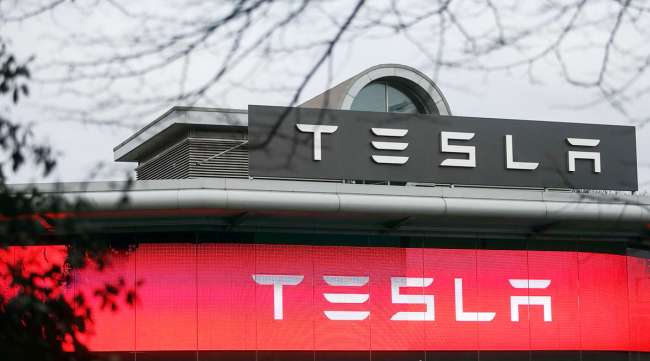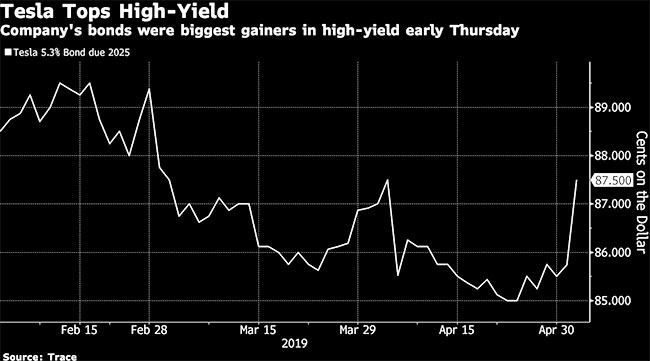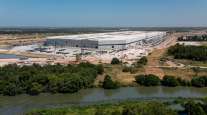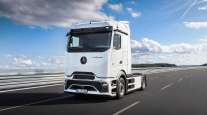Tesla Raises $2.35 Billion in Boosted Debt, Stock Offerings

Tesla Inc. raised $2.35 billion through debt and stock offerings that expanded from the company’s initial plans, helping to put some near-term liquidity fears to rest.
The electric car maker raised $750 million selling common stock and $1.6 billion from convertible bonds, up from originally offering $650 million and $1.35 billion. The capital raise sparked a relief rally in both Tesla’s stock and bonds, which had reflected investor worry over whether the company can be sustainably profitable.
“The raise should refute lingering concerns about TSLA’s ability to access capital markets,” Ben Kallo, a Robert W. Baird & Co. analyst who rates Tesla the equivalent of buy, said in a note May 3. “Surplus cash should help alleviate investor concerns around liquidity.”
Tesla priced the stock at $243 per share and will pay 2% semiannual interest on the convertible bonds due 2024, which were issued with a 27.5% conversion premium, according to filings. Tesla stock, which had been down 30% this year, closed 4.3% higher May 2 while the price of its bonds advanced. The shares are trading lower before the market open May 3 in New York.
Tesla tapped the markets again after Elon Musk overestimated the ability of the Model 3 sedan to generate enough cash for the company to be self-sustaining. The CEO said on several occasions last year that Tesla no longer would need to raise capital as its first mass-manufactured car ramped up. Musk changed his tune after the first quarter, when a record decline in vehicle deliveries and the company’s biggest-ever debt payment depleted its cash balance to a three-year low of $2.2 billion.

Musk is participating in the equity offering by buying about $25 million in stock, according to a filing May 3, up from $10 million. Tesla hired Goldman Sachs Group Inc., Citigroup Inc., Bank of America Corp., Deutsche Bank AG, Morgan Stanley, Credit Suisse Group AG, Societe Generale SA and Wells Fargo & Co. to underwrite the share offering.
“We view this as a clear net positive for Tesla,” Dan Ives, an analyst at Wedbush Securities, said in a note May 2. The electric car maker needed to “take its medicine and clear the air of the very real investor worries.”
The convertible bonds priced at the high end of the initial range communicated to investors, allowing Tesla to boost the size of the offering. On May 2, the securities were being marketed with a coupon of between 1.5% and 2%, according to people with knowledge of the matter. The conversion premium was being talked at a range of 27.5% to 32.5%, said the people, who asked not to be identified discussing the private deal terms.
Tesla’s 5.3% bonds due 2025 were trading higher early May 3, quoted at 87 cents on the dollar, according to Trace. They were among the best performers in the U.S. high-yield market May 2, while credit default swaps tied to the debt rallied the most since October. It now costs about $1.6 million upfront to insure $10 million of Tesla bonds against a default for five years, down from $1.7 million May 1.
The combined offering is positive for Tesla’s credit profile by boosting cash, Moody’s Investors Service analyst Bruce Clark said May 2. It will help Tesla to repay a November debt maturity of $566 million of outstanding convertible notes, fund the cash requirements from the expansion of Model 3 shipments into Europe, and cover the cash burn that might result from any softening in demand for the Models 3, S and X in the US, he said.
After reporting a loss per share that was double what Wall Street expected, Musk sought to assure investors on Tesla’s April 24 earnings call that the company would return to profitability in the third quarter. He told analysts there was “merit to the idea of raising capital” to expand.
Several Tesla analysts were expecting a capital raise of about $2 billion. The infusion will get Tesla closer to a ratio of 15% of cash to sales, a historical level among traditional auto manufacturers and suppliers, according to Bloomberg analyst Joel Levington. Tesla has stayed at around half that level, he said.




